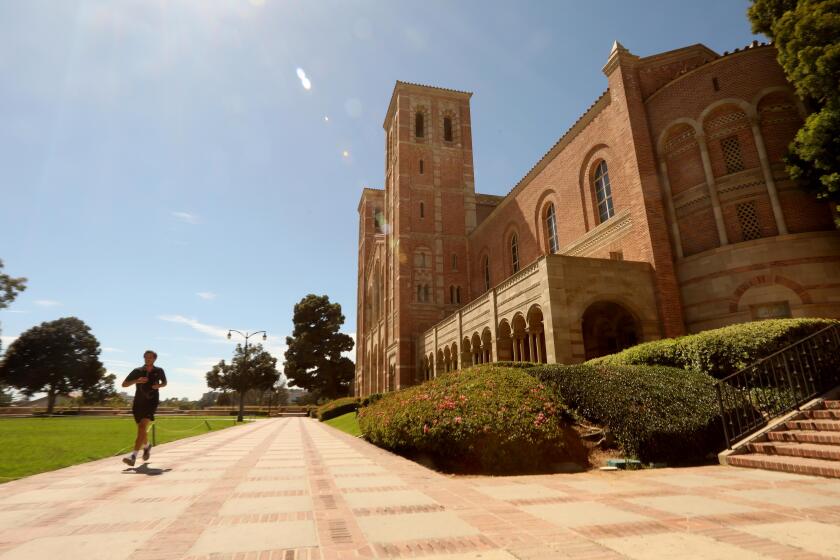Decades after California’s affirmative action ban, legal debate stalls funding for Black students

- Share via
SACRAMENTO — Decades after California voters approved a ban on affirmative action, Gov. Gavin Newsom is citing the state law as a hindrance to giving schools extra funding to support Black students.
But some civil rights advocates are pushing back, saying Newsom has otherwise been willing to take on a legal fight for causes he is passionate about, including gay marriage and gun control.
Groups including the NAACP and Al Sharpton’s National Action Network asked the governor for state funding to go specifically to Black public school students, who consistently fare worse academically than their peers.
What Newsom offered in his state budget after meeting with advocates, though, does not mention race. Instead, his proposal directs more funding at the state’s poorest schools and adds accountability requirements for low performing students.
Newsom’s resistance to a race-specific proposal is largely because of legal concerns surrounding Proposition 209, a controversial measure approved by California voters that banned affirmative action in 1996. In 2020, voters rejected an attempt to repeal it, affirming the prohibition against granting preferential treatment based on “race, sex, color, ethnicity, or national origin” in state programs including college admissions and public schools.
Under Proposition 16, public universities would have been allowed to consider race, sex, color, ethnicity or national origin to address diversity.
While the Newsom administration says his budget will in effect give the support to Black students that advocates are calling for, Margaret Fortune, who oversees a chain of charter schools focused on Black student achievement, and served as an advisor to former Govs. Arnold Schwarzenegger and Gray Davis, said it’s a “misguided” attempt that falls short.
“Gov. Newsom has never demurred or shied away from a lawsuit. In fact, he routinely antagonizes this Supreme Court, taking on issues like a woman’s right to choose and gun control, and we applaud him for that. We would also like for him to defend Black students,” Fortune said. “Instead, California has become the ‘don’t say Black’ state.”
At a news conference Thursday at a Sacramento area school touting education proposals including universal transitional kindergarten, Newsom said that while he is unafraid to “push the envelope,” this time is different because the conservative majority on the U.S. Supreme Court is poised to end affirmative action at colleges.
“We’ve looked at it. We’ve pushed. I assure you,” Newsom said. “We’re trying to do our best in a very difficult and challenging environment.”
This article was originally on a blog post platform and may be missing photos, graphics or links.
The conflict highlights California’s longstanding failure to ensure that Black students learn and perform at rates similar to their peers, even a decade after overhauling state education funding to direct more money toward helping disadvantaged students.
Under the Local Control Funding Formula, created in 2013, districts maintain flexibility in spending but generate extra funding based on the number of children who are English learners, low income or foster youth. Civil rights groups wanted Black students added as a fourth category for those supplemental grants.
California’s Black students are the lowest academically performing group, with 30% meeting English standards and 15% meeting math standards in the 2021-22 academic year, according to state data. Comparatively, 61% of white students met reading standards, and 48% met math standards.
Newsom’s income-based proposal doesn’t work, advocates say, because Black students regardless of income and ZIP Code are being underserved in even the best of schools and are outperformed by white students of similar incomes.
In his budget plan unveiled last month, Newsom proposed changes to the state’s school funding formula, including $300 million annually for an “equity multiplier” that boosts funding at elementary and middle schools where 90% of students are eligible for free meals and high schools where 85% are eligible.
That’s in addition to more than $13 billion in pre-existing supplemental grants for disadvantaged students.
Under Newsom’s budget proposal, schools would be required to publicly identify student performance that is “very low” and annually develop a district-funded plan to assist those students.
That means that 95% of Black students in California will be impacted because they are enrolled in districts potentially facing those new accountability requirements due to low performance, according to Newsom’s staff.
Zeroing in on low-performing schools will help remedy racial disparities while avoiding legal problems, said Brooks Allen, executive director of the California Board of Education and an advisor to Newsom.
“Equity has already been at the heart of the Local Control Funding Formula since its inception,” Allen said. “This really demonstrates an effort to ensure that that promise can be realized.”
A coalition of Black student advocates said that’s not the same as carving out money specifically for Black students. They estimate that more than 80,000 Black students have received no assistance from grants under the existing formula for otherwise at-risk students, and that the lowest income schools targeted in Newsom’s equity plan enroll only about 5% of the state’s Black students.
Assemblymember Akilah Weber (D-La Mesa) authored legislation last year that would have guaranteed funding for California’s “lowest performing” group — Black students — but she pulled the bill after conversations with the governor.
Weber picked up the mantle from her mother, Secretary of State Shirley Weber, a former state lawmaker, who authored similar legislation, which also failed.
In a statement, a spokesperson for Akilah Weber said that she is “comfortable with the direction” that Newsom is going in. The Black Legislative Caucus, of which Weber is a member, also showed support for Newsom’s proposal, as well as the California Assn. of African American School Administrators. They echoed Newsom’s points, saying that new clarity on the school funding formula will force districts to address Black student achievement.
The groups’ position is at odds with the California Reparations Task Force, which, as part of its recommendations for reparations for descendants of enslaved people, asked that Black students be added as beneficiaries of supplemental grants in the state’s school funding formula.
Aides for Newsom said that there has been a widespread and “damaging” misconception among school districts that pre-existing grants designed for at-risk students cannot also be used to address the needs of Black students. But some districts have earmarked money for Black students: Los Angeles Unified operates a Black Student Achievement Plan and has also diverted funds from school police to support Black students.
Erwin Chemerinsky, dean of the UC Berkeley Law School, said statewide school funding programs dedicated specifically to Black students would violate Prop. 209 and federal equal protection laws.
“If the state would create a program that was to benefit Black students, that would be a preference based on race and would clearly violate the state Constitution,” Chemerinsky said. “However much I agree it’s desirable, it would surely get struck down by the courts, and you’re losing time to come up with ways to benefit that group that does have a chance of succeeding.”
Chemerinsky said federal law “unfortunately is not moving in a sympathetic direction.”
Advocates of race-based funding pointed to President Biden’s 2021 executive order to advance educational equity for Black Americans as proof that Newsom can do more.
Christina Laster, who represents the western region of the National Action Network, said the governor’s response to their requests has been “tragic.”
“We know it’s a systemic discrimination and racial issue that needs to be addressed from a systemic and structural standpoint,” she said. “It seems like California is backing away, and that’s a betrayal to Black citizens.”
More to Read
Sign up for Essential California
The most important California stories and recommendations in your inbox every morning.
You may occasionally receive promotional content from the Los Angeles Times.












